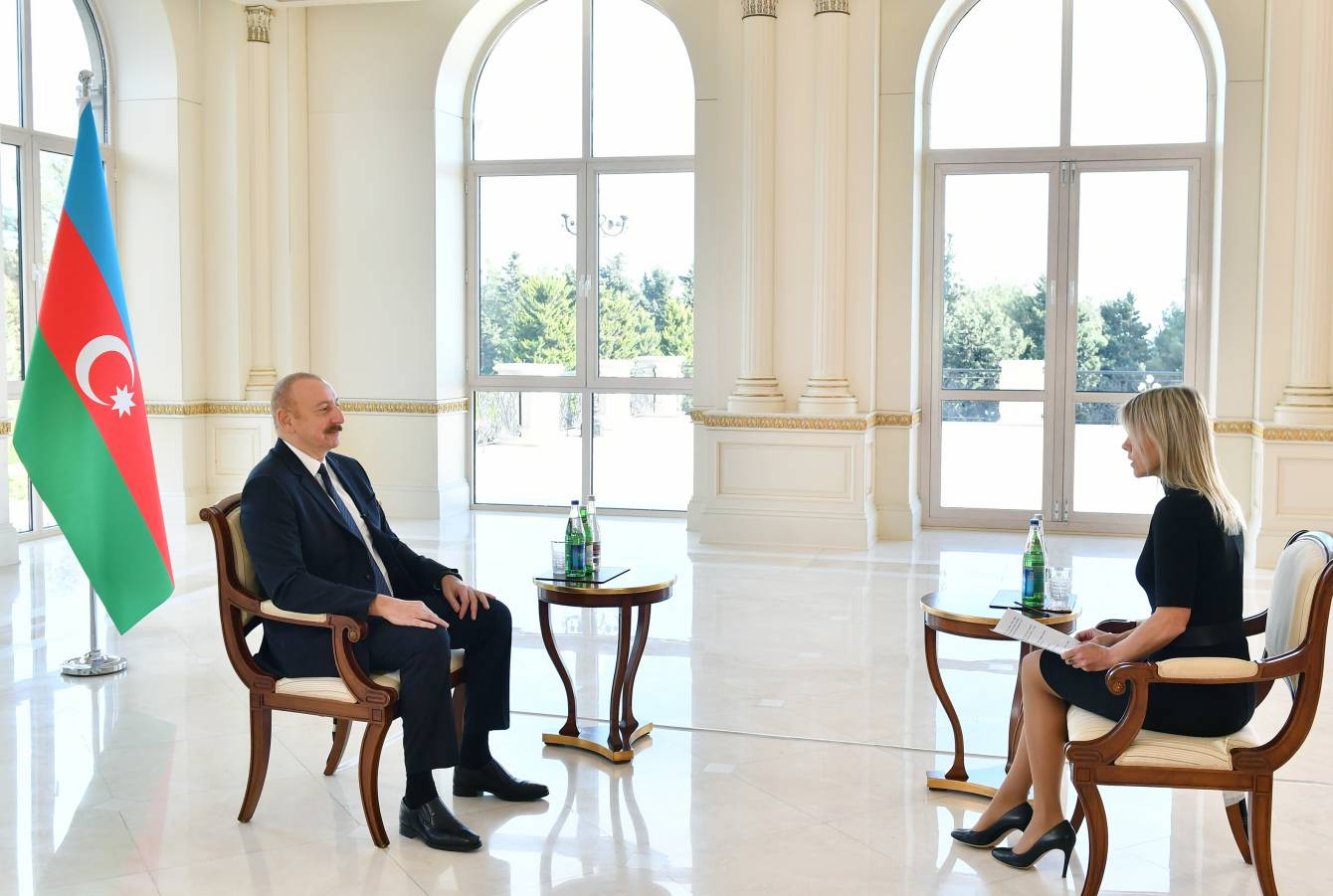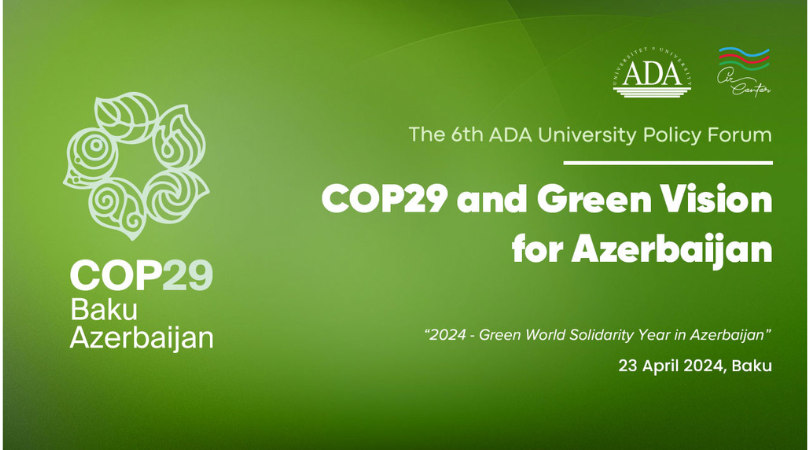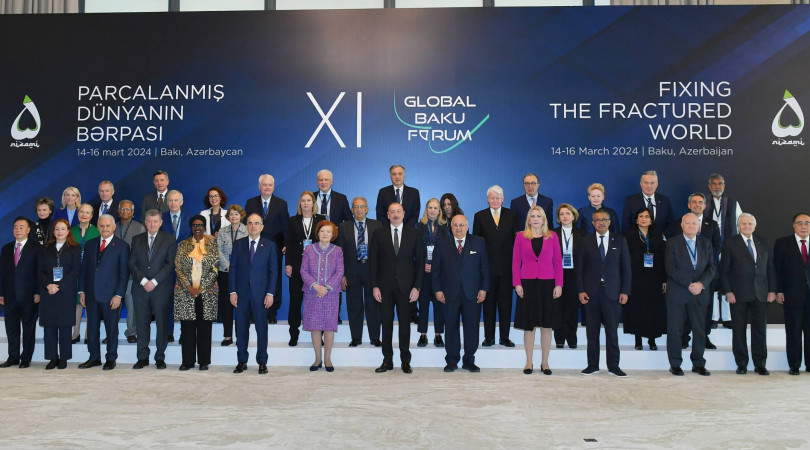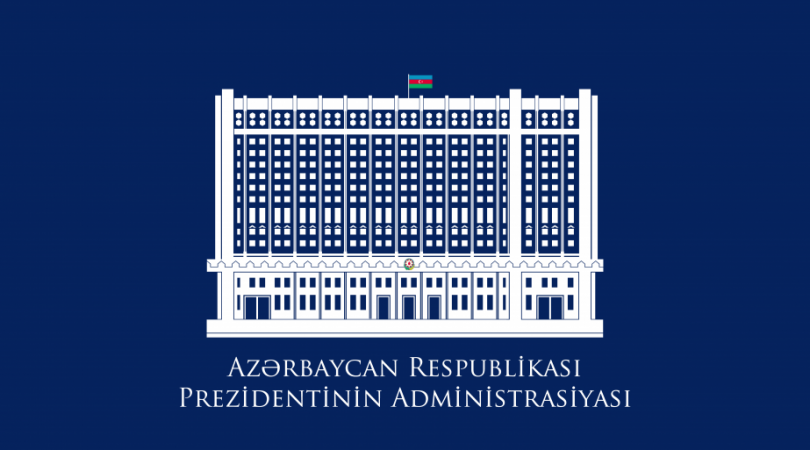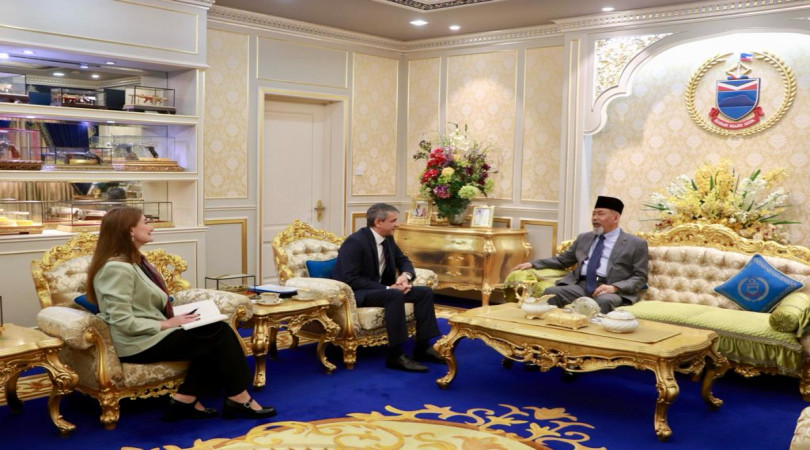President of the Republic of Azerbaijan Ilham Aliyev was interviewed by Euronews channel on November 23
The interview was broadcast on Euronews on December 9.
Correspondent: Hello, Mr. President.
President Ilham Aliyev: Hello.
Correspondent: Azerbaijan and the countries of the Central Asian region experience significant economic growth in 2023, according to the estimates from the European Bank for Reconstruction and Development. This strong growth is attributed to a high-level of migration and the remittances originating from Russia, which is under sanctions. Additionally, there has been an increase in regional export and imports, including business with China. The outlook for 2024 shows the same positive trend. What does this growth mean for your country?
President Ilham Aliyev: As far as Azerbaijan is concerned, our economic development and growth are mainly generated by our reforms rather than those factors, which you mentioned. We managed to diversify our economy, and to reduce the dependence on oil and gas sector, though, oil and gas sector continues to be the main part of our economy. This year, our economic growth is a little bit modest, because of the slight decline of the oil production. But if we look at the past years, the GDP of Azerbaijan grew more than four times for the last 20 years, and that was a very remarkable achievement. At the same time, we managed to conduct a very sophisticated, social policy. We managed to reduce the level of people who lived in poverty during the last 20 years from almost 50 to 5.5 percent. This demonstrates that the wealth generated by energy projects was fairly distributed between all segments of our population.
We also worked actively in order to reduce the level of foreign debt, and now, it is below 10 percent of our GDP. The target for that is 7 percent of GDP next year. So, this actually demonstrates the sustainability of Azerbaijan’s economy. Next year, we hope that the growth of economy will be higher. But, those figures do not actually reflect 100 percent of the economic performance or the living standards of the people. We know the countries, which had very low economic growth, but the very developed economy.
So, the bigger your GDP is, the more difficult it is to add to that growth, especially in today's geopolitical situation, where two of our neighbors and main trade partners Russia and Iran are under the sanctions. Therefore, we need to take that into account.
But our target and our strategy of 2030 is based on our own resources, our own financial capability, as well as foreign and local investments in the areas, which will provide economic growth in the coming years.
Correspondent: What are your future areas of development and investments?
President Ilham Aliyev: As far as our governmental policy is concerned, our state investment program will be mainly directed to the liberated areas of Karabakh and Eastern Zangazur. First, because we need to resettle former refugees as soon as possible. We plan to resettle more than 140,000 people by the end of 2026. For that, we need to invest largely in infrastructure, housing projects and social infrastructure project. At the same time, this area, which has been for 30 years under occupation, possesses a big potential in the area of agriculture, hydro energy, solar and wind energy and tourism. That will be a main area of the state investment program.
With respect to foreign investments, of course, investments in fossil fuel project will continue. Because there is a big potential in Azerbaijan with respect to resources and big demand for Azerbaijani gas in Europe. It is a growing demand, but very remarkable development is related to renewable sources of energy. I think, this will be the main direction of direct foreign investments. We already inaugurated last month the 230 MW solar power plant, the biggest in the region, fully invested by foreign investors. Up to 10 gigawatts of solar and wind power generation is planned to be implemented within next five-six years. I think, these will be the main areas of investments along with our agenda on digital transformation.
Correspondent: Do you see competition in your region or rather a cooperation?
President Ilham Aliyev: Well, as far as Azerbaijan is concerned, I see cooperation. That is mainly because of the policy of our country. We always wanted to protect Azerbaijan from any kind of a rivalry, from any kind of a geopolitical struggle or battle between big powers, and I think we managed to achieve that. Azerbaijan is considered as a reliable partner to many big international actors, and we see a real result of that cooperation. If you look at the energy development in Azerbaijan, you'll see a broad international presence. If you look at the transportation sector, you'll see that both corridors - East-West and North-South – cross our country and our neighbors and many countries in different regions are benefiting from that.
If you see the situation with respect to the political development, Azerbaijan is also a country with the independent foreign policy, which conducts its policy based on national interests. One of the important factors is not to transform your country into the area of confrontation or competition but rather to protect the state from bad influence and attempts to interfere into its domestic affairs. So, we successfully managed to diminish these risks. And, that's why Azerbaijan now is a country with big international potential, good international reputation, and a country, which managed to attract more than 300 billion US dollars of investments during the last 20 years.
Correspondent: Energy supply has been a major topic for Europe over the last two years. What is your outlook for your country's energy business?
President Ilham Aliyev: Our energy development transformed from oil to gas. At the same time, oil production and export still is an important part of energy security for many countries. Completed almost three years ago, the Southern Gas Corridor, the major gas infrastructure project, which is an integrated pipelines system of 3,500 kilometer in length, created an opportunity for Azerbaijan to increase the geography of its gas supplies. Today, we export gas to Georgia, Türkiye, Greece, Bulgaria, Italy, Romania, and we signed contracts with Hungary and Serbia. Albania will also be part of our gas distribution plans.
So, you see how many countries in Eurasia, mainly European countries, are our partners, and demand for Azerbaijani gas is growing. We positively responded to the request from the European Commission to increase the gas supply to European continent with respect to the sanctions on Russia. This will continue to be important part of our business.
At the same time, I already mentioned the renewable sources of energy. We have a very windy weather today in Baku, which is actually the normal weather condition and we have a huge potential of wind, especially in the Caspian. So, 10 gigawatts of solar and wind power generation projects have already been signed as contracts and MoUs. That will allow Azerbaijan to have a very smooth transition from fossil fuels to renewables, at the same time, to provide European consumers with the green energy.
Correspondent: What are your concerns about the risks to your country's economic development?
President Ilham Aliyev: Frankly speaking, I don't see any risks. Because, our economic development was so far very positive, even in a much more complicated geopolitical situation, even during the times of occupation, our economy grew. And now when we totally restored our territorial integrity and sovereignty and we are implementing large-scale economic reforms, which allow us to accumulate more funds into our budget. We have conducted very successful reforms in the customs and taxes administration issues. We created a corporate management system in all our state-run companies, and we see the benefit of that.
Of course, a lot of wealth will be generated from the connectivity projects. As I already mentioned, we expect additional tens of millions of cargo through North-South and East-West transportation corridor crossing Azerbaijan's territory in different directions. It means employment, it means additional funds, and it means geopolitical importance of Azerbaijan. If you look at the map of our region and Eurasia, you'll see that all the major transportation routes cross our territory. We've developed the most modern transportation infrastructure. That will create additional opportunities. Plus, liberated territories of Karabakh and Eastern Zangazur, where we plan to resettle hundreds of thousands of former refugees, will also be an additional driver. So, frankly speaking, I don't see any potential risks neither in economic area, nor in any other area of our country.
Correspondent: No risks at all?
President Ilham Aliyev: For today, I don't see. Maybe potential risks may come from beyond our borders. Inside Azerbaijan, we don't have it. We have a very stable political system, we have the very well based unity of our people, especially after liberating our occupied territories in the historical Victory. Our economic performance is successful. Our economy is self-sufficient, we do not depend on foreign loans. As I said, next year it will be 7% of GDP only. If you look at our hard currency reserves and foreign debt, you'll see that our hard currency is 10 times bigger than the debt. So, in other words, we can within one month level our foreign debt. Not many countries in the world can do this. The self-sufficient economy with good political connections, with major international actors and the political stability and unity in the country – all these factors demonstrate that internal risks we do not have. External, yes, but that will depend on the situation beyond our borders. We have war beyond our borders to the North, we have an unstable situation in the Middle East, we have potential tensions in the neighborhood. So, it could be a potential risk for Azerbaijan. For that purpose, we need to pay more attention to the protection of our borders, but our borders are open for friends and closed for those who want to do something harmful.
Correspondent: How SPECA Programme is important for the economies of the participating countries?
President Ilham Aliyev: SPECA Programme today commemorates the 25th anniversary, and I'm grateful to our colleagues from Central Asia for supporting our initiative to hold the Summit, which is the first Summit in the history of the SPECA Programme. Actually, this programme is based on the economic interaction between Central Asia and Azerbaijan, and today we see the new dimension of that interaction. If you look at the economic data, if you look at the dynamics of the bilateral visits, you will see that during the last two years, active interaction between Azerbaijan and all the Central Asian countries as well as between Central Asian countries is an unprecedented level high. So, this is a new reality, and we need to capitalize on that.
We have excellent relations with all countries of SPECA. We have a lot of investment projects now - Azerbaijani investments in Central Asia, Central Asian investments in Azerbaijan. We have connectivity projects of the East-West Trans-Caspian transportation route, which for Central Asian countries is now one of the most attractive transportation connections with the Black Sea, with the Mediterranean and with Europe through the integrated connectivity projects. We see a lot of positive dynamics on the political track, because countries of SPECA in this difficult geopolitical situation today demonstrate stability. This is one of the most important factors. Because without stability, there is no investments, no economic development and no security. If you look at today's SPECA members, you will see that Central Asia and Azerbaijan is an area of geopolitical stability, though the risks are just next door. For countries of Central Asia, these risks are even higher than for Azerbaijan. So, this might be taken as an important factor of success of these countries.
25 years ago, all of us, we were in a completely different situation with respect to the economic development, large-scale social problems, and also we were just in the first phase of our journey on the path of independence. Now, we can already report about the success. We organized an exhibition in Baku Expo Center. I think it is very illustrative to demonstrate what our country is. It is a small part of our achievement, but nevertheless, very illustrative demonstration for what we have done. One of Azerbaijan’s foreign policy priorities is more active cooperation with the countries of Central Asia, and we consider the SPECA Summit in Baku as one of the factors, which is part of that policy.
Correspondent: With its strategic geographical position between East and West, Azerbaijan places itself in a pivotal location. What is the country's strategy on the international stage?
President Ilham Aliyev: We will continue to conduct independent policy on international stage. We are chairing for the fourth year the second largest international institution after the United Nations, the Non-Aligned Movement. According to the overall opinion of many member states - 120 member states - Azerbaijan played an important role in bringing a new dimension and dynamics to the Non-Aligned Movement. We made a lot of steps on institutional development of the Non-Aligned Movement creating a parliamentary platform, youth platform, working on the creation of the women`s platform. We were very active on COVID pandemic issue providing assistance to more than 80 countries. So, our championship in the Non-Aligned Movement allowed us to demonstrate our policy, our capability, and, by the way, our chairmanship was extended for one year by unanimous decision. 120 countries, not all of them are in good terms with each other, but when it comes to Azerbaijan, all of them unanimously supported us. So, this is the best demonstration of international support. Sometimes when some politicians talk about international community, they mean only, maybe, several dozens of countries. But, international community is more than 200 countries, and majority of those countries support Azerbaijan. This is only one dimension.
Our relations with our neighbors are well balanced and based on friendship and mutual interest. Our relations with European institutions also have its own positive dynamics. I already mentioned energy projects, how we support Europe, when Europe asked us to provide that support. We did it, because we always try to help those who ask us for that. Our relations with the Muslim countries is an example of solidarity and partnership. Azerbaijan is considered as one of the most active members of the Organization of Islamic Cooperation. So, this covers actually almost all the members of international community and our policy was always aimed at providing support when somebody needs it, and to demonstrate a friendly approach to all the countries. And now - after restoration of our territorial integrity and sovereignty, the ability of Azerbaijan on international arena, of course, will be much bigger. International reputation of Azerbaijan, a country, which on the battlefield defended its territory, its dignity, and implemented the resolutions of the United Nations Security Council itself, is, of course, skyrocketing now.
Correspondent: In an interview with the Euronews back this summer, you said that you had hoped that peace between Armenia and Azerbaijan but nevertheless could be achieved by the end of the year. Do you still maintain this position that peace can be achieved, especially after tens of thousands had to leave their homes and what is next for the dynamics of this region?
President Ilham Aliyev: Yes, I was optimistic about the timetable, because we exchanged several times with Armenia the comments on the original draft peace treaty, which Azerbaijan elaborated itself. After that, there have been six times of exchange of comments between the two countries, and when I was talking about that the last time to Euronews, I hoped that Armenia will not prolong the process of evaluation of our comments. We submitted the last comments to them on September 11, and received a response from them only two days ago. So, almost two months and a half, they had been evaluating the draft, which consists of several pages. What does that mean? That means that they want to artificially delay the process. Now, we are talking at the end of November, and the hopes for achieving peace and signing peace treaty by the end of the year are not very optimistic. But, I think that the timetable is not so important. Important is the agenda of both countries. It was Azerbaijan, who suffered occupation and ethnic cleansing. Million Azerbaijanis were deported by Armenian government. Devastation of the territory of almost 15,000 square kilometers.
Nevertheless, we were the country, which made a proposal to sign a peace agreement, and to start working on the delimitation. So, Armenia, now after Karabakh portfolio is closed, I think, will be more willing to come to an agreement with us. Because after the restoration of our sovereignty and elimination of the illegal separatist regime in Karabakh, I think, the main factor, which prevented Armenia to be more courageous on negotiation track, don't exist any longer.
So, we will evaluate their latest proposals, which as I said, we received two days ago, and will comment on that. In the meantime, we are maintaining the contacts on the working-level between different officials and through different channels. I think there's no alternative for peace. If peace agreement is not signed that will be very bad for the whole region. We want a region of the Southern Caucasus to get rid of any risks. Of course, we want Armenia, today and in the future, never put under question our territorial integrity, and abandon completely any territorial claims to Azerbaijan.
Correspondent: So, what are the conditions for peace to be achieved finally?
President Ilham Aliyev: Well, we elaborated five basic principles, which should be the basis for peace agreement: mutual recognition of each other's territorial integrity; no use of force; no territorial claims to each other; opening of the communications between both countries and normalization of relations; and several other important factors. All of those have been based on international law. During almost three years of negotiation process, Armenia always wanted to incorporate into peace agreement a provision with respect to the Armenian minority in Karabakh. Our position was that this is our internal business. If they want to reflect the issue of Armenian minority in Azerbaijan, then, let us reflect the issue of Azerbaijani minority in Armenia, which was expelled thirty years ago. And, there were much more Azerbaijanis in Armenia than Armenians in Azerbaijan - almost 300,000. So, our position was that it must be reciprocal. Either we reflect these two issues of national minorities, their rights and security, including the right to return not only Armenians to return to Azerbaijan, but Azerbaijanis to return to Armenia. It doesn't matter that Azerbaijanis were expelled 30 years ago, and Armenians decided to leave two months ago. The fact is just it must be reciprocal, or we do not comment in our peace agreement about this issue. So, until now, we did not get from Armenia any clear understanding on that. So, if Armenia agrees to have either the same language for both national minorities or not to reflect it at all, then the peace is reachable, because this was a main obstacle for Armenia, when they were negotiating with us. So, we will see how it goes. Frankly speaking, I don't see now any serious obstacle to sign a peace agreement from a logical point of view.
We say we need to sign it, they say it, but we need to deliver. Our proposal was made public. Those famous five principles, which I'm talking about, we made it public. It is known. There is no objection from any responsible international actor, because all these principles are fundamental principles of international law. Armenia just need to comply with that. They should put an end to all those attempts to contest our territorial integrity, and to sponsor separatism on our territory, because Karabakh is part of Azerbaijan, and all, including Armenia itself, recognize this. The Armenian Prime Minister is the person who in 2019 in Khankendi at the big rally said: “Karabakh is Armenia”. That was the end of negotiation process, because after that, there was nothing to negotiate. So, actually, the reason for the Second Karabakh War was exactly Armenian government. Now the same person says “Karabakh is Azerbaijan”. So, it’s good, it's evolution. We always support evolution, but now saying “Karabakh is Azerbaijan”, they need to put a signature under that, and we are waiting for that.
Correspondent: And what about those people who have left their homes?
President Ilham Aliyev: As to those people who left their homes, first of all, that was their own decision. Our public communications with Karabakh Armenians, and what we did after, demonstrated that we wanted them to stay. We openly announced that and I, during my appeal to Azerbaijani people after the end of anti-terror operation, said that they could stay. We opened the electronic portal of registration. All of those who want to come back have this right. Their property is duly protected. All the historical and religious sites are duly protected.
In order to come back they need to comply with certain regulations, and I was saying that many months before the anti-terror operations, those who want to stay need to apply for the Azerbaijani citizenship. Because how can people live in Azerbaijan being a citizen of another country? Either citizenship or work permit, or residence permit. They cannot live in Azerbaijan saying that they live in so-called “nagorno-karabakh republic”. Because so-called “nagorno-karabakh republic” doesn`t exist. They invented it in their dreams in their mythology. If they want to live in Azerbaijan as citizens of Azerbaijan, of course, they can. Azerbaijan is a multi-ethnic country, multi-confessional country. We have many ethnic groups in Azerbaijan. Some of these ethnic groups, the number of these ethnic groups, people who belong to them is much bigger than Armenian population in Karabakh. All of them live in peace, they enjoy all the rights and security. In our proposal to Karabakh Armenians, which was, by the way, published, we also covered their rights. Their right for their language, for their education, religion, municipal rights. They can elect their representatives through municipal elections and continue to live there. The decision to leave was their own decision, and according to information, which we now have access to, that was a deliberate act of former so-called “leaders” of so-called “nagorno-karabakh republic”. There was no need for them to leave, but when they decided to leave, we could not stop them. We provided maximum comfort for them to leave in peace, unlike Azerbaijanis, who were either killed 30 years ago or deported, tortured, arrested, and some of them had to cross high mountains, and were just frozen to death in those mountains. All that was documented en route. All that was also documented when Armenians of Karabakh region entered Armenia. So, all was done in line with humanitarian standards. But again, coming back to the question, they can come back.
Of course, they need to register in the electronic portal, which we opened and which is available, that they want to come back, they want to take Azerbaijani citizenship. Several of them already applied for citizenship, and it is now in the process. Some Armenians decided to stay in Karabakh, and now they've been taken care of by our Ministry of Labor and Social Protection of Population and Migration Service, they are registered. Not completely everybody left. But in order to live in Azerbaijan, for instance, if you want to live in Azerbaijan, what should you do? You should get a work permit, residence permit if you want to live for a long time or citizenship. So, how can you live in Azerbaijan being a citizen of other country? It's not possible. The same is here.
If an Azerbaijani refugee, who was expelled from Armenia wants to come back there, how he will come back? He will not come back and say I'm here resident of Western Azerbaijan Republic. No. He will come and apply for citizenship or work permit. Why should it be different here? And that's how it will work only. Through municipal elections, they can elect their representatives, which will be in charge of municipalities. All this information was delivered to Armenian representatives of Karabakh just after the anti-terror operation, and then when we realized that they did not make it public to the population of Karabakh, we made it public, we published it.
So, this is a legal process based on international norms and standards. Again, I'd like to say that Azerbaijan is a multi-ethnic country and no ethnic group in Azerbaijan ever had any concerns or any problems based on their religious or ethnic grounds. Anyone who knows Azerbaijan can confirm this. By the way, today, we have Armenian population living in different parts of Azerbaijan without any problems. Armenians and Azerbaijanis are living side by side in Russia, living side by side in Ukraine, and even in the same villages in Georgia. Why they cannot live in Azerbaijan or in Armenia? I think they can.
Correspondent: Thank you very much, Mr. President.
President Ilham Aliyev: Thank you.
